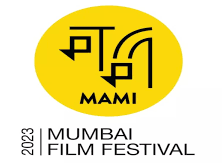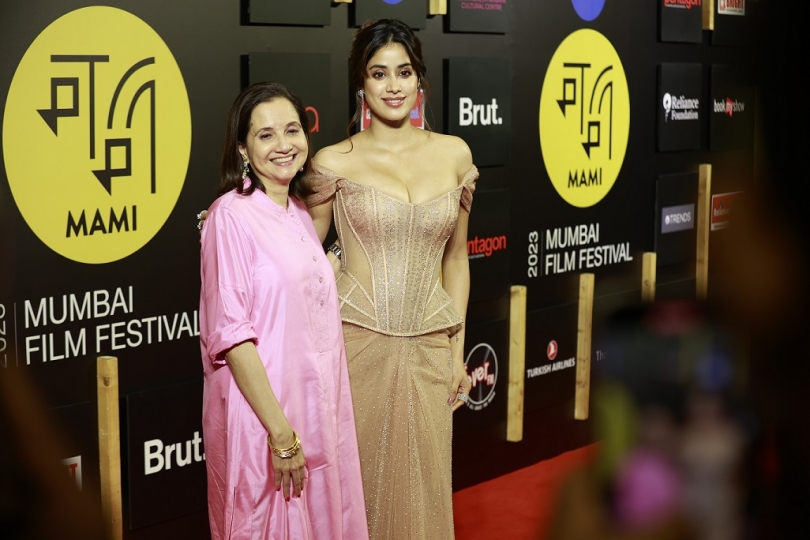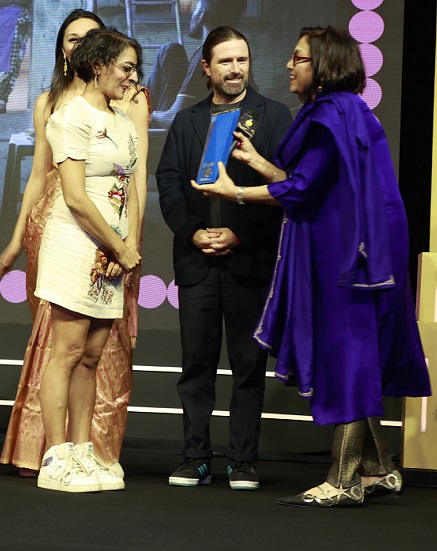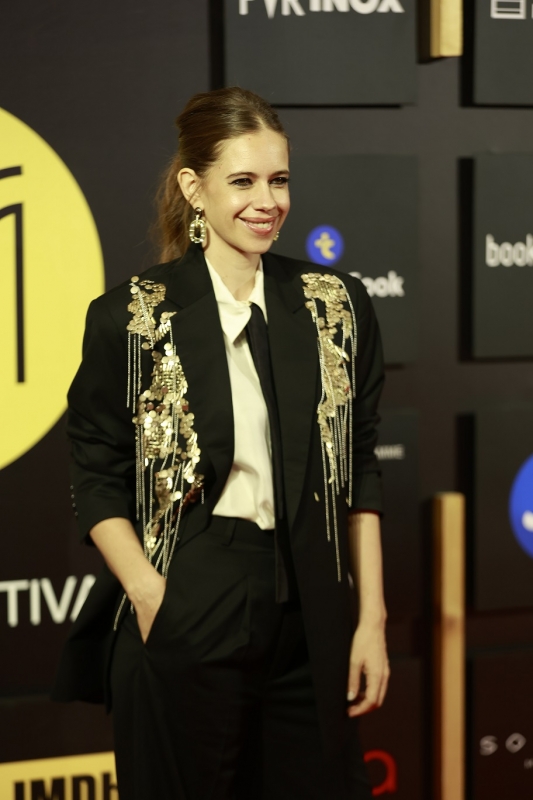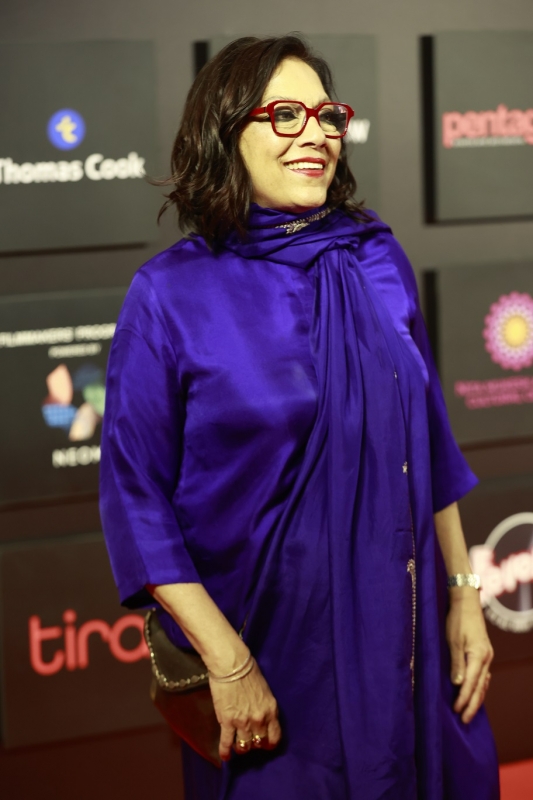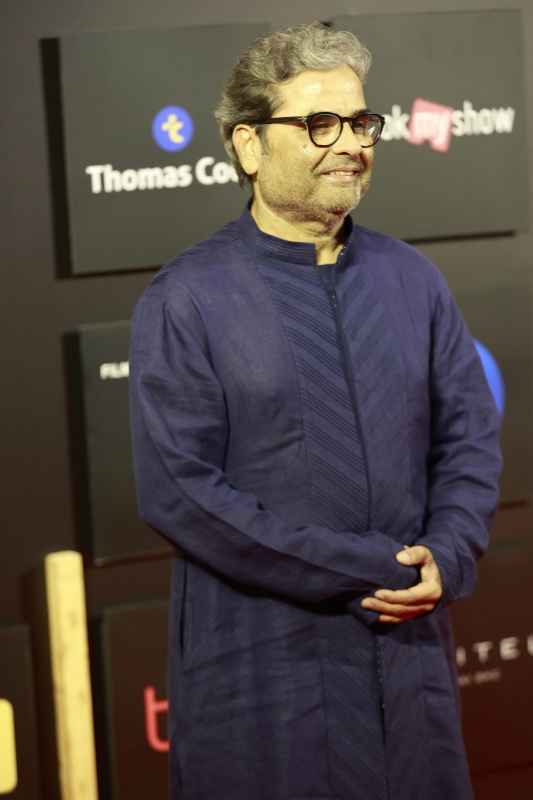|
|
||
|
Pro Tools
FILMFESTIVALS | 24/7 world wide coverageWelcome ! Enjoy the best of both worlds: Film & Festival News, exploring the best of the film festivals community. Launched in 1995, relentlessly connecting films to festivals, documenting and promoting festivals worldwide. We are currently working actively to upgrade this platform, sorry for the inconvenience. For collaboration, editorial contributions, or publicity, please send us an email here. User login |
Siraj SyedSiraj Syed is the India Correspondent for FilmFestivals.com and a member of FIPRESCI, the International Federation of Film Critics. He is a Film Festival Correspondent since 1976, Film-critic since 1969 and a Feature-writer since 1970. He is also an acting and dialogue coach. @SirajHSyed  MAMI’s Mumbai Film Festival: The chosen ones, the winning ones
MAMI’s Mumbai Film Festival: The chosen ones, the winning ones It must have been January 1995. A group of film-makers and film-buffs were talking about Mumbai having its own film festival, since the International Film Festival of India was held in New Delhi, and Filmotsav was a travelling festival that had rarely come here. Although the hub of film activity and endowed with a world class infrastructure, the festival was held in Mumbai only four times in 43 years. The group included Shyam Benegal, Sudhir Nandgaonkar and others. I was all for it. What worked in its favour was that the NFDC, Films Division and Children’s Film Society were headquartered in the city, while the Film and Television Institute of India (FTII) and the National Film Archive of India were in nearby Pune. Come 1996, and the plan took shape. A trust was set-up, called Mumbai Academy of Moving Image, later to be identified only with its acronym, MAMI. I could not contribute in any way, because I moved to Singapore in 1996, and was there for eight years. MAMI put up its first Mumbai Film Festival in 1997. I did attend a few, whenever I took leave from my jobs and visited India. It was a modest beginning, but Mumbai now had its own festival. Once I moved back to Mumbai, in 2004, I attended almost all the festivals. Of course, this was in addition to attending IFFI, Mumbai International Film Festival (MIFF), the Third Eye International Film Festival, and a few others. At one stage, MAMI had to rescued, and a group of mainstream film personalities rose to the occasion. Glitz and glamour were added, and corporate sponsorship obtained. Venues increased. But along with these developments, there seemed to be an arrogance setting in. Getting accredited/registered as a journalist became a task for me. Then there were the two functions, the inaugural and the closing, where the awards were announced and distributed, which were strictly out of bounds for humble journalists like me. This year, they were generous with the closing ceremony function, and I attended it. No such luck with the opening ceremony. In fact, it took the better part of the opening day to get myself registered. MAMI has Priyanka Chopra Jonas as the Chairperson and Nita Mukesh Ambani is the Co-Chair. The Festival Director, for many years now, is Anupama Chopra. Co-incidentally, she is on the international voters’ list for the Golden Globe Awards, and so am I. She had this to say about the Jio MAMI Select-Filmed on iPhone, 15 Pro Max and edited on MacBook Pro initiative. “Cinema worldwide is going through a tectonic change, and it's wonderful to see film-makers experiment with different formats of story-telling. We are thrilled to announce Jio MAMI Select—Filmed on iPhone—to empower young and emerging film-makers, to tell stories that they are passionate about. Can’t wait to see all incredible things that these filmmakers do with the iPhone 15 Pro Max and MacBook Pro.” The short films will premiere in April 2024 at a special screening event, in association with Jio MAMI Mumbai Film Festival. The short films will be available to be viewed on Jio MAMI Mumbai Film Festival’s YouTube channel, following the première. This year, the Jio MAMI Mumbai Film Festival took place from Friday, October 27 to Sunday, November 5, 2023, after a Covid hiatus. The awards ceremony was held on 03 November, two days before the festival ended. This was a first. The South Asia Competition awards were presented by the jury, which included Head of Jury, Mira Nair, Australian writer and film-maker David Michod, Filipino film-maker and actor Isabel Sandoval, and Edouard Waintrop, French Film Critic and Festival Director. The jury awarded the Golden Gateway award to Against the Tide, by Sarvnik Kaur, the Silver Gateway award went to Bahadur - The Brave, by Diwa Shah, and the Special Jury Award went to Agra, by Kanu Behl. The Film Critics Guild Gender Sensitivity Award was announced for a film that challenges gender stereotypes and norms. It was given by the jury, which included film critic Aditya Shrikrishna and RJ Stutee Ghosh. The winner in this category was Barir Naam Shahana (A House Named Shahana), by Leesa Gazi. The Rashid Irani Young Critics Lab is a special programme created by Jio MAMI to nurture young writers, within the realm of cinema. The Rashid Irani Young Critics’ Choice Award was presented by Christian Jeune, Director of the Film Department, Deputy General Delegate, Festival de Cannes. The winner in this category was Kayo Colour? (Which Colour?) by Shahrukhkhan Chavada. Rashid was a colleague, and his mention brought a lump to the throat. Next at the event was the NETPAC award, given to a film from the main South Asia Competition section. Presenters included jury members Dr. Gulnara Abikeyeva, a film critic, researcher, and head of jury, along with writer and editor Latika Padgaonkar and Festival Director of the Sydney Film Festival, Nashen Moodley. They presented the award to Rimdogittanga (Rapture), by Dominic Sangma. This year at the festival, the global media company Civic Studios joined hands with Jio MAMI, to create a new category of award, the Light Camera Impact Award. This award recognised two non-feature films focussing on subjects of climate, sexuality, and caste. Through these awards, the intent is to spotlight engaging short films that spark conversation on socially relevant topics. The awards were presented by Civic Studios founder Anushka Shah and film-maker Kiran Rao. The two winners were Blackhole, by Pradyumna Patil, and Praan Pratishthana (Consecration) by Pankaj Sonawane. Flowering Man, by Soumyajit Ghosh Dastidar got a special mention in this category. One of the most sought-after awards of the night was the IMDb Audience Choice Award, for the most popular film at the festival, as chosen by the festival attendees. IMDb India head Yaminie Patodia and Anupama Chopra presented the award, to The Monk and the Gun, by Pawo Choyning Dorji. Jio MAMI Mumbai Film Festival closed with a grand ceremony at the Nita Mukesh Ambani Cultural Centre (NMACC). One of the biggest film festivals in South Asia, Jio MAMI, this year had over 300 films in 70 languages, from 70 different countries. Of these, a record number of 70 films are by female film-makers. The festival also had 40 world premieres, 45 Asian premieres, and over 70 South Asian premieres. The festival was spread across 8 venues (I restricted myself to just 3) and 20 screens. The closing ceremony was hosted by the incredibly talented actor Kalki Koechlin, with flair, and was followed by the screening of Sofia Coppola’s Priscilla. One of the most anticipated films at the festival, it is based on Priscilla Presley’s 1985 biography, Elvis and Me, written with support from Sandra Harmon. It stars Cailee Spaeny, Jacob Elordi, and Dagmara Dominczyk. Although I was very keen on seeing Priscilla, I could not wait till 11.30 pm, when it would have probably been screened. The awards ceremony was followed by cocktails and dinner, which went on till 11 pm, or even later. Coming to then award-winning films, I have been singularly unlucky. I only saw a part of Barir Naam Shahana. A routine Bengali language melodrama, about religion-based traditions that make life very difficult for women in BanglaDesh. Since I have already seen several films in this genre, and since Barir was not offering anything new, I made my quiet exit. On the other hand, the Monk and the Gun was refreshing, and smoothly acted and directed. No wonder it won the IMDb most popular film award. Against the Tide is about fishermen in Mumbai, and moves rather slowly. Result? Exit. Bahadur-the Brave is about illegal Nepali workers, and has some good performances. Was mildly watchable. Another mildly watchable film, with a very unusual theme, was Rapture. A SriLanka-Nepal co-production, The Red Suitcase (Fidel Devkota) was yet another example of an unusual theme, this one bordering on the ghost territory. Amidst some stunning visuals, it had very little to say, and left the ending open. Even a name like Vikramaditya Motwane fails to turn Ind(i)ra’s Emergency, a biopic, into edge-of-the-seat stuff. Some footage from foreign sources, and the shots of the late Prime Minister Indira Gandhi manage to hold interest. A film within a film, Something Like and Autobiography (Mostofa Sarwar Farooki) is not like most BanglaDeshi films. It’s no great cinema, but can be seen, to realise that BanglaDesh does not make only sob stories. Since Joram was a film by Devashish Makhija, I made the journey from Link Road, Andheri, to PVR Maison, BKC. It was a full house, and I got to meet and greet Devashish. Joram was among the best films I saw at MFF this year, though it is not his best work. Tackling the theme of Naxalites in Latehar (Jharkhand), he has his ace performer Manoj Bajpayee in the lead, with excellent support. Three countries jointly produced God is a Woman (Andres Peyrot), a documentary, about one of the largest remaining indigenous tribes in Latin America. It did not meet expectations, prompting me to move towards the door. Les Indésirables, from France, directed by Ladj Ly, focused on the problem of those who live in cheap buildings that are up for demolition. You would not miss anything if you missed the undesirables. Moving into the vampire domain, we had probably the longest tile of the festival, Humanist Vampire Seeking Consenting Suicidal Person (Canada, Ariane Louis-Seize). In this case, the title gives away the theme, almost entirely. Not a bad film to watch. The same can be said about Goldfish (Pushan Kriplani), which promised a lot but delivered less. Urf (aka) sets out to make the contributions of star duplicates/mimics count, but makes a cinematic mess of it. Geetika Narang Abbasi, with good credentials, is unable to steer this one to the cinematic shore. As apparent, I saw hardly any award-winning films. Just my bad luck What? Just so many films in a 10-day festival? That’s a bad score. It is. But remember, there were numerous films I walked out of, after 20-30 minutes, because, at a film festival, my tolerance for sub-standard films decreases rapidly. The Selection Committees did their job. If I don’t see merit in most of the films I chanced to see, it is not their fault. lost the first day, then half of the closing ceremony day, then I was ill for one day, and then the fact the theatres are located rather far from my house, and I never stayed back for the late evening show, because transport to my home from the venue I had chosen is not available after 9 pm. But I tell myself, “Don’t worry, there is IFFI coming up, followed by the RSIFF.” Here’s to cinema, cheers to cinema. Noted writer-director Vishal Bharadwaj, and lnternational fame Mira Nair, contributed to the success of MFF, in various capacities. 13.11.2023 | Siraj Syed's blog Cat. : Anupama Chopra
|
LinksThe Bulletin Board > The Bulletin Board Blog Following News Interview with EFM (Berlin) Director
Interview with IFTA Chairman (AFM)
Interview with Cannes Marche du Film Director
Filmfestivals.com dailies live coverage from > Live from India
Useful links for the indies: > Big files transfer
+ SUBSCRIBE to the weekly Newsletter DealsUser imagesAbout Siraj Syed Syed Siraj Syed Siraj (Siraj Associates) Siraj Syed is a film-critic since 1970 and a Former President of the Freelance Film Journalists' Combine of India.He is the India Correspondent of FilmFestivals.com and a member of FIPRESCI, the international Federation of Film Critics, Munich, GermanySiraj Syed has contributed over 1,015 articles on cinema, international film festivals, conventions, exhibitions, etc., most recently, at IFFI (Goa), MIFF (Mumbai), MFF/MAMI (Mumbai) and CommunicAsia (Singapore). He often edits film festival daily bulletins.He is also an actor and a dubbing artiste. Further, he has been teaching media, acting and dubbing at over 30 institutes in India and Singapore, since 1984.View my profile Send me a message The EditorUser contributions |

















